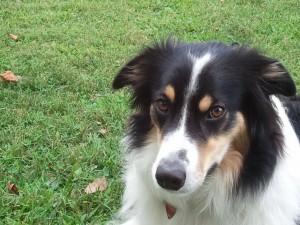On Saturday the fourth seizure begins the same way as the first, with high pitched screaming and bared jaws snapping open, his body jerking as his muscles convulse, his eyes, unseeing. He drools uncontrollably. He messes himself. Our hands rest lightly on him; we keep his head from striking anything. Afterwards, the screaming stays with us. He screams as if he has been struck by slow-motion lightning and can feel it twisting him all about inside.
Our border collie has epilepsy; it strikes this breed more than most others. No one knows why. The disease can only be managed. There is no cure.
 When he emerges from a seizure, he looks around with a frantic disorientation. He knows something is wrong. One of us sits with him. Sometimes he sleeps for hours.
When he emerges from a seizure, he looks around with a frantic disorientation. He knows something is wrong. One of us sits with him. Sometimes he sleeps for hours.
We love him. I would protect him with my body, and though I would do violence to someone trying to harm him, he is not my child. Dogs are not children. Such comparisons are morally inaccurate and unnerving. We neither collar, own nor euthanize children. He is only my dog, but only is a slippery word.
When he looks at me, when we look at each other, an awareness encompasses us, the plural us, the pair, the two of us. Some part of it is my sense of protectiveness for a vulnerable creature we have raised and trained, but deeper than that I can feel a contract of sorts, one based on mutual affection and shared experiences.
For example, this cloudy morning we walked on a steeply ascending path in dense woods. Even the still air seemed a dark forest green. The birds were silent. Nothing stirred. I could hear my footfalls. Wolfie rarely barks at any time; now he trotted silently along the trail, sometimes with me, but often behind me, smelling, marking, stopping and watching. One whistle or a SHUA will bring him to my side where my hand gesture will cause him to sit and hold. A low click will tell him we are switching direction. He stays with me.
When we walk together, I am more alive to the woods or fields; his presence brings me out of my head. When he pauses and looks away, I follow his gaze. I have learned to trust his calm wariness, his dispassionate gaze at something I cannot see or sense. On our best days together, we extend each other. With him I become more of an animal. These are not small gifts.
Edward Hoagland called dogs the “tug of life at the end of the leash.” Maybe Hoagland means that “life” to be the impersonal vitality that we can sometimes feel surging through us, the sense of well-being that is based on muscle and movement and not on our minds. Wolfie brings that to my life, as Pete did before him and Montana before Pete, and if I stay lucky in having time, another will do so after Wolfie. But I think Hoagland also meant that “life” to include the desire to connect, no matter the line of connection — a handshake, an embrace, a gaze, a leash quivering with a variety of elation.
So therefore I know that when Wolfie is wrapped in one convulsion after another and our hands lie upon him, his shaking body further instructs us in the affirming habit of love.